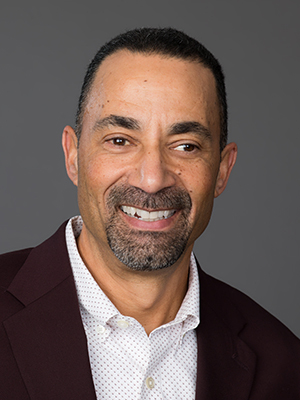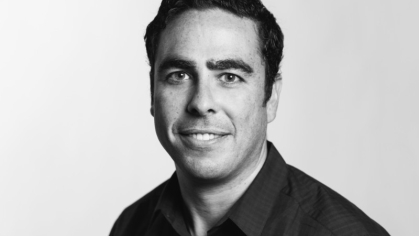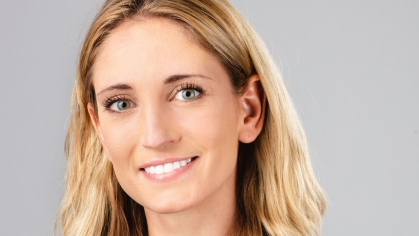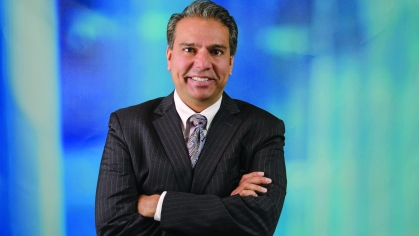
While today Kevin Edwards is principal vice president, chief diversity and inclusion officer at Bechtel Corporation, he began his 22-year career there as a project engineer, ultimately serving in quality leadership and field engineering management roles before becoming Bechtel’s global manager of diversity and inclusion. In his current role, he is responsible for developing a strategic diversity, equity, and inclusion roadmap to advance the acquisition and retention of diverse talent and to cultivate a culture that fosters and supports best DEI practices.
Where did you grow up?
I’m from Red Bank, NJ and was raised by a single parent.
Why Rutgers?
If we’re being honest, my heart was stuck on Cornell and the University of Florida., I was doing this alone, with a vision of what my friends were doing. I didn’t get into Cornell, and Florida only offered me a partial scholarship. While I was navigating through this myself the Rutgers EOF counselor came to my high school. He offered me a once-in-a-lifetime deal, that would pay for me to go to school, on the condition that I took part in the summer EOF program.
That was my introduction to Rutgers. I immediately had a community, This may be the best thing, though: Rutgers was in-state, but I could live on campus.
What drew you to Industrial Systems Engineering?
I graduated after five years, because I’d originally picked mechanical engineering to do what my high school friends were doing. I had a good friend, though, who switched to industrial engineering and told me about it. I liked that it had an engineering curriculum with a business aspect to it. I liked that process-oriented piece. My brain worked that way – once I switched my major, I started making the Dean’s List.
What prompted you to get your ME in environmental engineering from Stevens?
After college, the only job I could get was with the State Department of Environmental Protection, which recruited on campus. I was working with an environmental engineering consulting firm, when I got my ME to fine tune my skill set.
What do you most value about your Rutgers engineering education?
While I had a very good sound footing from the engineering perspective, it’s the community that mattered most. The community-based focus was really there, from EOF to my industrial engineering family – ten of us connected as a study group – to my social fraternity. There was a really good community of professors who cared about students. And I loved going to football and basketball games.
What led you from a traditional engineering path at Bechtel to spearhead its company diversity, equity, and inclusion efforts?
It was all connected with Rutgers, believe it or not. Rutgers alumnus Brian Reilly, ENG’80, who has since retired from Bechtel as a senior vice president, and I were making sure we were engaging with Rutgers by bringing talent into the company. We had a passion and a connection to hire talent from Rutgers. We demonstrated how we could bring in diverse talent through a very natural, yet intentional, process of engaging and partnering with student organizations.
One year, at a global business meeting, Brian and I and another senior leader sat on a panel on how we could make an impact, and our Rutgers partnership was key to that. As a result, Bechtel asked me to take on the role of global manager of diversity and inclusion. I asked myself “how could I not do this so that other students might have the opportunities I’ve had.” I served in that role for two years before assuming my current role as principal vice president and Chief Diversity and Inclusion Officer.
Why is your position so important to Bechtel?
Bechtel has been in business for nearly125 years. In order to sustain that success over the next 125 years the company is preparing for the future by being more innovative and competitive – and inclusive.
We always need to attract and retain diverse talent. Are we doing the things that matter most to this talent for long-term longevity? Are we budling the right culture and community so that new talent will stay and contribute to success of the organization?
Why is fostering diversity so important in engineering?
We should be inspired by the diverse talent that’s coming up and how they are thinking differently. Engineering talent doesn’t just go to engineering companies these days – it’s going everywhere from financial companies to service driven, process-oriented companies, like Amazon.
How do you describe your leadership style?
As a leader, you have to listen, enable, and guide. You have to know when to shift course and be creative. You must lead with inclusion anchored to all your decisions.
Have you continued to be involved with SoE as an alumnus?
I just ended my term on the CEE industry advisory board this year, where I’d been a member for ten years. My wife, a Rutgers alumna, and I do more now from a financial standpoint and are looking to do even more. I’m here on campus a lot, whether working with student organizations, taking part in panels, and trying to get to some football and basketball games. There are many different ways to give back!
Do you have any advice for today’s students?
Broaden your experience and take advantage of available opportunities. Get involved and engage in multiple student organizations, network and learn how to start to give back, and build these things into your schedule. Be a leader. Take more chances and risks – and seek out advice to help you navigate your decision-making. We look for these things in a resume, as a well-rounded talent can do multiple things.
What did you do for fun as a student?
We’d go to NYC to dance, and hang out and have a great time. My mom’s one piece of advice to me when I left for Rutgers was to have fun. I did.
What do you do for fun these days?
I’m a marathon runner. I enjoy spending time with my family. And I love doing my own yardwork. People don’t do it the way I want it done – I could have been a landscape architect.
Where would you go if you could take a vacation tomorrow?
I’d like to go to some place like Bora Bora, and just be with my wife and kids relaxing and enjoying beautiful beaches, clean water, great food, and great wine. I’d also love to go on a safari.


